On 30th
April 2018, the Nigerian Copyright Commission (NCC) suspended the licence of
music collecting society, Copyright Society of Nigeria (COSON) stating that the
suspension was consequent upon COSON’s “continued failure and/or refusal” to
comply with NCC’s earlier issued directive. The NCC had directed COSON not to give
effect to the resolutions taken at COSON’s meeting of 19 December 2017 except
the resolution on distribution of royalties to members.
This
suspension comes on the heels of Afroleopa’s views expressed in this IPKat
guest post on the infighting at COSON and the powers of the NCC as sector
regulator. As Afroleopa had opined, the powers of the NCC in relation to the
issues at stake regarding COSON include the power to suspend the licence of a
collecting society by virtue of the CMO Regulations.
It is
no longer news that despite these directives from the NCC, Mr Tony Okoroji (the
purportedly reinstated COSON Chairman) had gone ahead to conduct an Annual
General Meeting of COSON on 10th May 2018 and contrary to the NCC’s
directive, ratified the resolutions reached at the meeting of 19th
December 2017.
In
the circumstances, COSON’s governance challenges show no sign of abating. However,
while it is expected that the suspension will move COSON to regroup and take
the necessary steps to put its affairs in order for the benefit of its members
who are right-holders, it is pertinent to note the suspension of COSON’s
operating licence may not be the panacea to its problems. For one, COSON is the
exclusive assignee of performing rights assigned to it by its members. In
essence, COSON is the monopoly publisher of the performing right in Nigeria. As
the Nigerian member of the International Confederation of Authors and Composers Societies (CISAC), pursuant
to its Matrix User Tools Agreements, COSON remains the
owner of the world’s performing rights in Nigeria. Its membership of CISAC
guarantees it access to the CIS-Net database (a network of database for sharing
works metadata) as well as monopoly control in Nigeria to issue all of the requisite
qualifiers and identifiers such as International Standard Musical Work
Code (ISWC), the Tune Code, the Interested Party Name Number
(IPN#) and the Interested Parties Information system (IPI), which inter
alia forms the basis for determining authorship and ownership of musical works and
literary works (where songs have words) and by extension, accrued royalties and
members entitled to such royalties. CISAC does not require its members to be
accredited by their national sector regulator.










